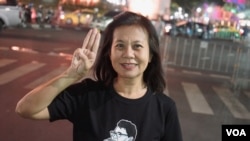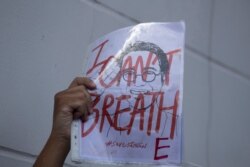She has been threatened more times than she can remember, harassed by legal cases and targeted by online trolls, but Pornpen Khongkachonkiet says she won’t stop championing human rights, especially while the law does not protect Thais from falling victim to “enforced disappearances” by shadowy powers.
She is not alone in her concerns.
Nine Thai dissidents have gone missing from overseas sanctuaries since 2016; the bodies of two who sought refuge in Laos were found in the Mekong river in 2019.
Brad Adams, Asia director of Human Rights Watch, referred in a statement to VOA to “a realization that shadowy powers operate outside the law in Thailand and beyond the effective control of the government or parliament.”
Currently in quarantine in a Cambodian hotel, Pornpen, a rights defender and legal advocate, is preparing to help the family of Wanchalearm Satsaksit, a missing 38-year-old Thai activist reportedly pulled by armed men into a vehicle outside his condominium in Phnom Penh in June.
Wanchalearm had fled the country to avoid charges by the ruling junta, which smothered dissent after it seized power in 2014. He is the ninth of the dissidents to have disappeared.
“You can give the family ‘a remedy’ and recover the victims’ bodies, but the only thing that might bring closure and peace of mind is the truth,” said Pornpen, known as Noi, who is director of the Cross Cultural Foundation, a Thai human rights organization.
'Threatened countless times'
Pornpen is a constant presence in the roughest corners of Thailand, tracing back human rights abuses through the victims, following glacial court processes and driving media interest when the state, police and army have long given up, or deliberately turned a blind eye.
From “Billy” Porjalee Rakchongcharoen, a disappeared ethic Karen land rights activist near the Myanmar border, to allegations of state torture against Muslim detainees in the Muslim-majority Deep South, where a low-grade insurgency continues, to Wanchalearm’s case, Pornpen says she is used to asking uncomfortable questions of those in power.
“I’ve been threatened countless times,” she said.
“People call me and say things like, “Aren’t you supposed to be a Thai Buddhist, why are you helping Muslims? Aren’t you Thai?”
The only occasion to rattle her, she said, was a criminal defamation complaint, later dropped, by the military over a 2016 report on the alleged torture of ethnic Muslim-Malays in Thailand's Deep South, on the Malaysian border. Defamation of a person or institution carries up to two years’ jail sentence in Thailand.
“I was scared because if I was indicted who was going to help these guys? I had dragged these innocent people into a calamity,” she said.
The case was later dismissed amid international pressure.
In Cambodia, Pornpen is once more treading into dangerous territory.
Wanchalearm’s family believes the Thai government knows what happened to the activist, who ridiculed the Thai government of Prayuth Chan-ocha on his Facebook page from Cambodia.
Pornpen is accompanying his sister and her lawyers to Cambodia with evidence she hopes will spur an investigation into the fate of her brother.
His disappearance has become a banner for a Thai protest movement desperate to sever the link between power and impunity.
“An ‘enforced disappearance’ is not something anyone can do. It takes a high level of organization by those who have power, because it often involves abduction, torture, killing, destroying evidence and getting rid of the bodies,” she told VOA before leaving.
The lack of a body leaves the trail cold, she said, presuming authorities are even looking in the first place.
“Thai authorities treat enforced disappearance cases like a lost wallet or a lost bike. There is no investigation whatsoever,” she said.
“It’s my job, my duty to discover the truth. Once I find the facts out, I have to help,” she said.
Rebel at heart
She says she has had a rebellious spirit since childhood; she recalls asking her mother, at 6 years old, why she was being asked to prostrate herself in front of a royal family member, as is customary In Thailand.
She credits growing up with marginalized communities, ethnic Karens at school in Ratchaburi, with giving her an early education on “the structural problems in our country.”
Her main ambition is to see the law changed and the country codify protections taken for granted in many other nations.
Thailand signed the International Convention for the Protection of All Persons from Enforced Disappearance in 2012, but it has yet to ratify it, insisting it must first pass a domestic law before joining the convention. Several years on, the law is still not on the books.
Critics blame political obstruction by elements of the army-aligned government, unnerved by the prospect of a law that could see a slew of cases against people in power.
After all, the military-linked government of Prayuth Chan-ocha -- and the junta he led after seizing power in a 2014 coup -- has hustled laws through a parliament stacked with its allies, including a hand-picked senate, appointed under a constitution the army wrote.
“There’s a cybercrime law, a law banning political assembly but not the one that aims to protect lives and liberty of people to be free from torture and enforce disappearances,” Pornpen said.
After six years of faltering rule, Prayuth is now in a corner. A youth-led protest movement is refusing to leave Bangkok’s streets until he resigns and a new fairer constitution with rights at its core is written.
The youth “speak the language that I once had to learn in my law school,” she said, “But they learn in a day from internet. Change is already in the air.”

